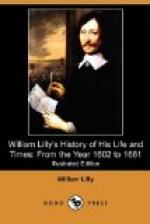In the church of this town there is but one monument, and that is a white marble stone, now almost broken to pieces, which was placed there by Robert Lilly, my grandfather, in memory of Jane his wife, the daughter of Mr. Poole of Dalby, in the same county, a family now quite extinguished. My grandmother’s brother was Mr. Henry Poole, one of the Knights of Rhodes, or Templars, who being a soldier at Rhodes at the taking thereof by Solyman the Magnificent, and escaping with his life, came afterwards to England, and married the Lady Parron or Perham, of Oxfordshire, and was called, during his life, Sir Henry Poole. William Poole the Astrologer knew him very well, and remembers him to have been a very tall person, and reputed of great strength in his younger years.
The impropriation of this town of Diseworth was formerly the inheritance of three sisters, whereof two became votaries; one in the nunnery of Langly in the parish of Diseworth, valued at the suppression, I mean the whole nunnery, at thirty-two pounds per annum, and this sister’s part is yet enjoyed by the family of the Grayes, who now, and for some years past, have the enjoyment and possession of all the lands formerly belonging to the nunnery in the parish of Diseworth, and are at present of the yearly value of three hundred and fifty pounds per annum. One of the sisters gave her part of the great tithes unto a religious house in Bredon upon the Hill; and, as the inhabitants report, became a religious person afterwards.
The third sister married, and her part of the tithes in succeeding ages became the Earl of Huntingdon’s, who not many years since sold it to one of his servants.
The donation of the vicarage is in the gift of the Grayes of Langley, unto whom they pay yearly, (I mean unto the Vicar) as I am informed, six pounds per annum. Very lately some charitable citizens have purchased one-third portion of the tithes, and given it for a maintenance of a preaching minister, and it is now of the value of about fifty pounds per annum.
There have been two hermitages in this parish; the last hermit was well remembered by one Thomas Cooke, a very ancient inhabitant, who in my younger years acquainted me therewith.
This town of Diseworth is divided into three parishes; one part belongs under Locington, in which part standeth my father’s house, over-against the west end of the steeple, in which I was born: some other farms are in the parish of Bredon, the rest in the parish of Diseworth.
In this town, but in the parish of Lockington, was I born, the first day of May 1602.
My father’s name was William Lilly, son of Robert, the son of Robert, the son of Rowland, &c. My mother was Alice, the daughter of Edward Barham, of Fiskerton Mills, in Nottinghamshire, two miles from Newark upon Trent: this Edward Barham was born in Norwich, and well remembered the rebellion of Kett the Tanner, in the days of Edward VI.




